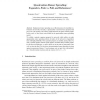Free Online Productivity Tools
i2Speak
i2Symbol
i2OCR
iTex2Img
iWeb2Print
iWeb2Shot
i2Type
iPdf2Split
iPdf2Merge
i2Bopomofo
i2Arabic
i2Style
i2Image
i2PDF
iLatex2Rtf
Sci2ools
ICALP
2009
Springer
2009
Springer
Quasirandom Rumor Spreading: Expanders, Push vs. Pull, and Robustness
Abstract Randomized rumor spreading is an efficient protocol to distribute information in networks. Recently, a quasirandom version has been proposed and proven to work equally well on many graphs and better for sparse random graphs. In this work we show three main results for the quasirandom rumor spreading model. We exhibit a natural expansion property for networks which suffices to make quasirandom rumor spreading inform all nodes of the network in logarithmic time with high probability. This expansion property is satisfied, among others, by many expander graphs, random regular graphs, and Erd˝os-R´enyi random graphs. For all network topologies, we show that if one of the push or pull model works well, so does the other. We also show that quasirandom rumor spreading is robust against transmission failures. If each message sent out gets lost with probability f, then the runtime increases only by a factor of O(1/(1 − f)).
ICALP 2009 | Quasirandom Rumor Spreading | Random Graphs | Rumor Spreading | Theoretical Computer Science |
| Added | 19 May 2010 |
| Updated | 19 May 2010 |
| Type | Conference |
| Year | 2009 |
| Where | ICALP |
| Authors | Benjamin Doerr, Tobias Friedrich, Thomas Sauerwald |
Comments (0)

